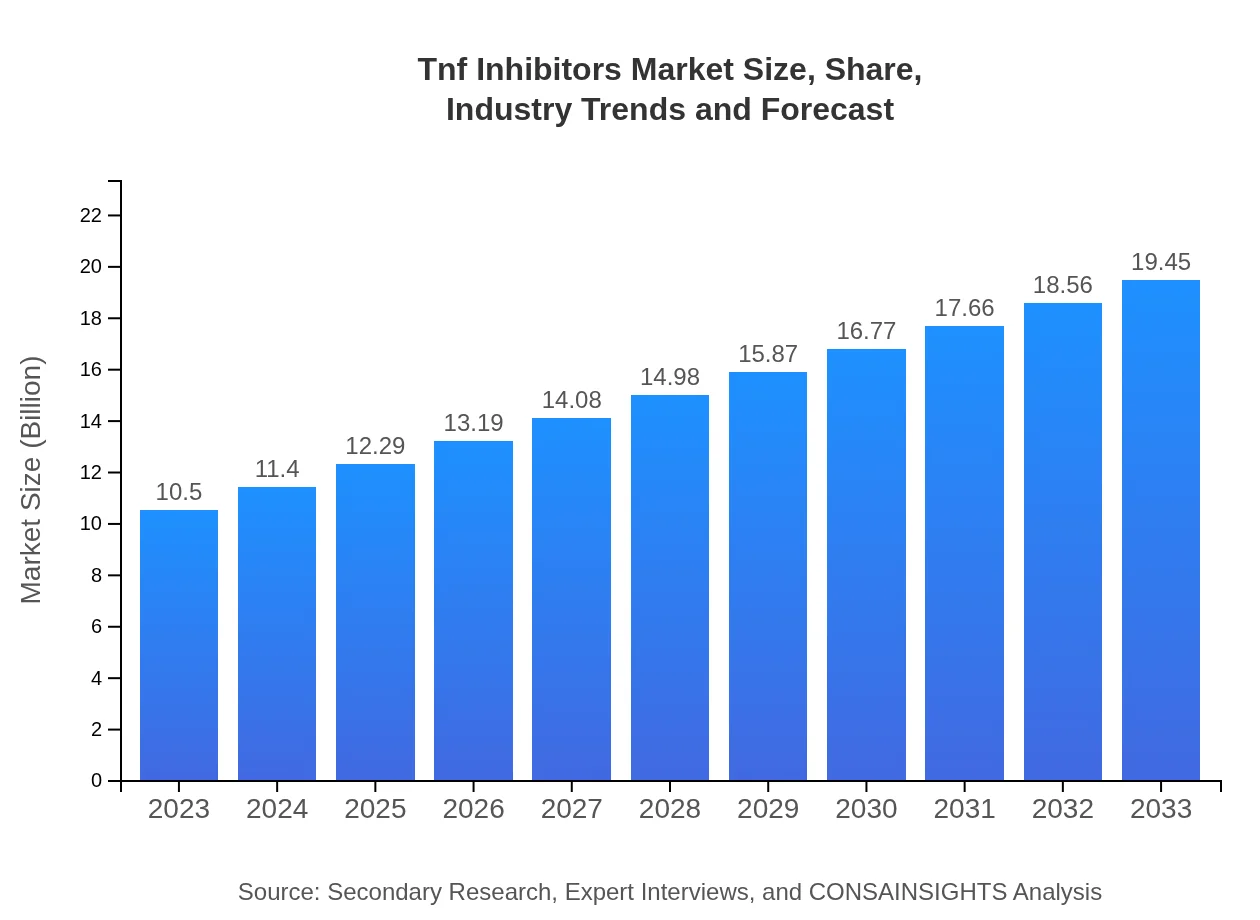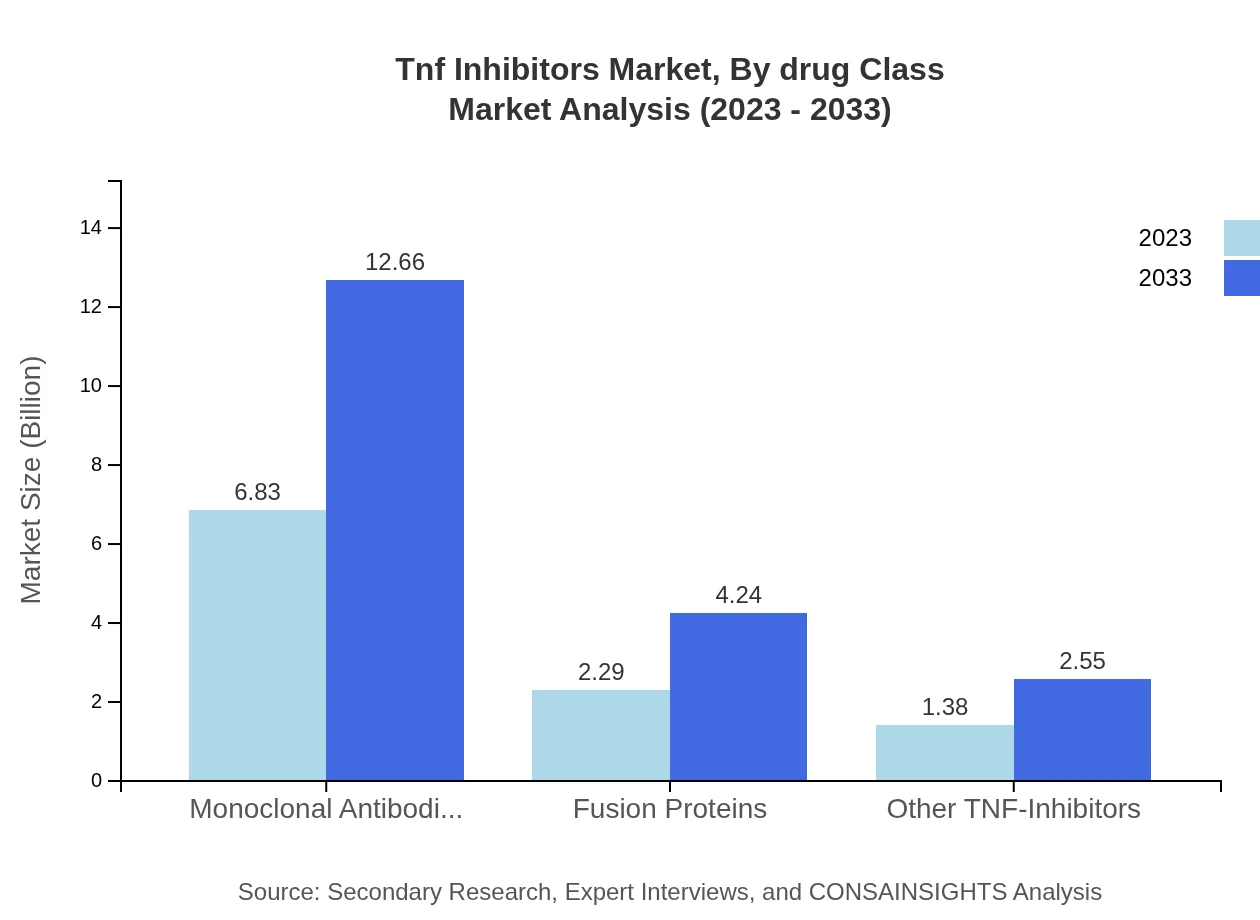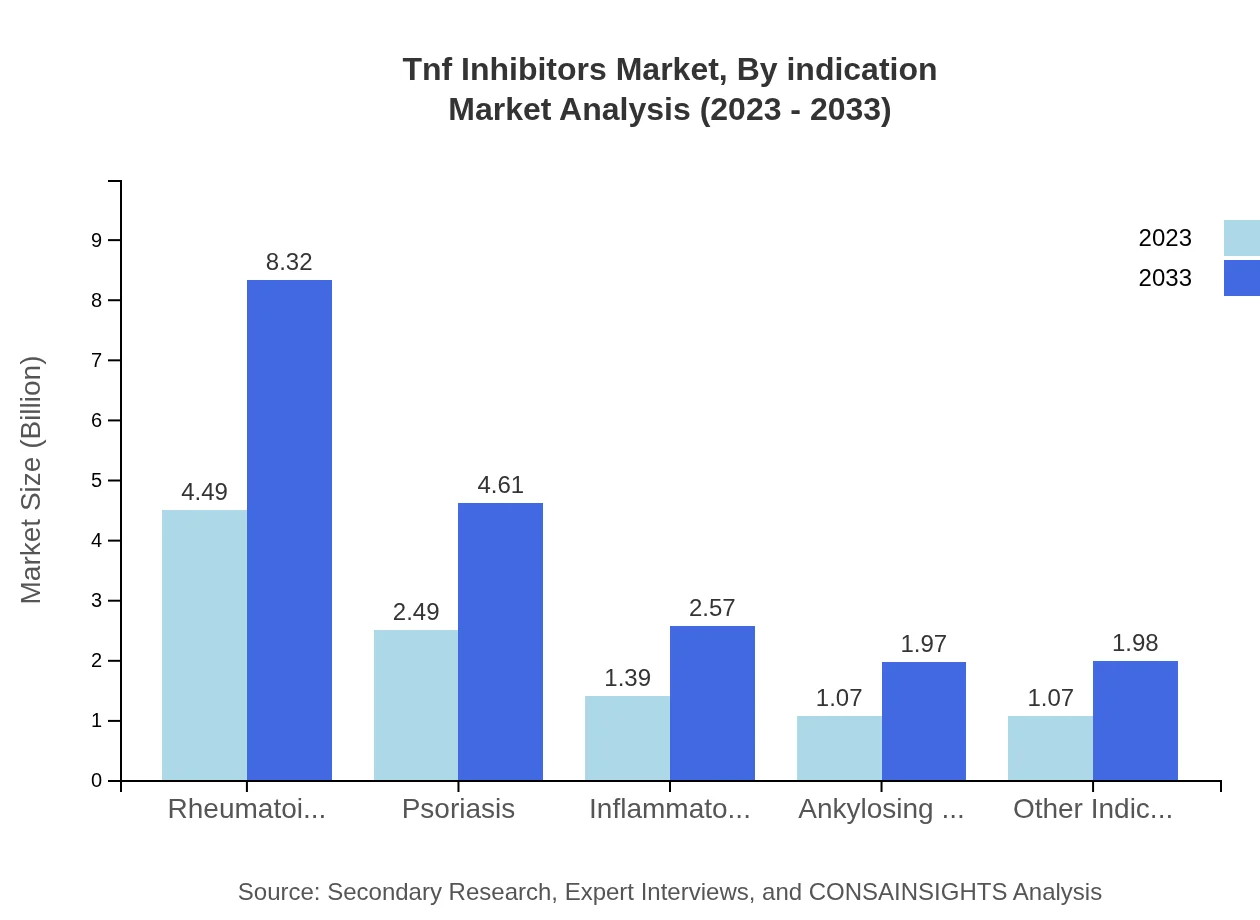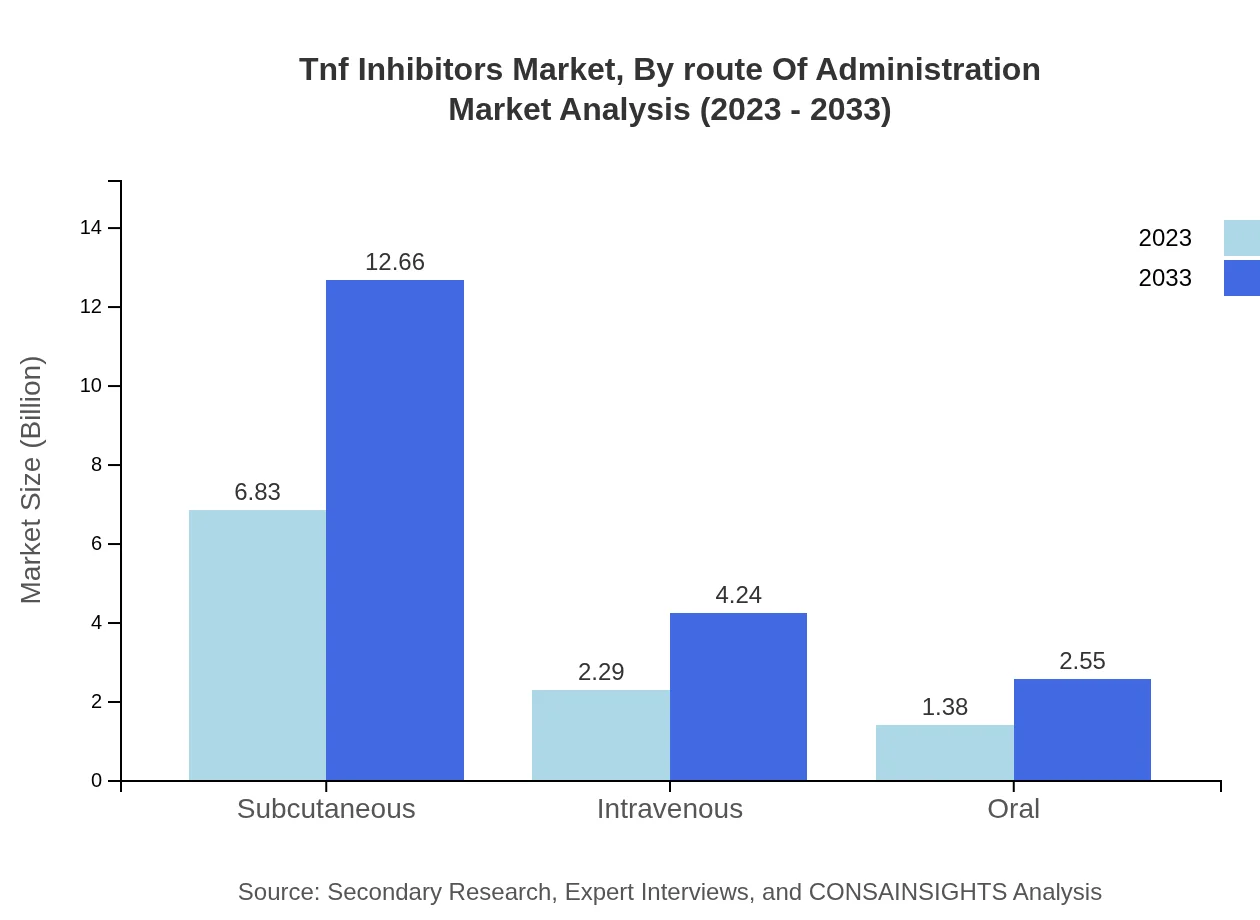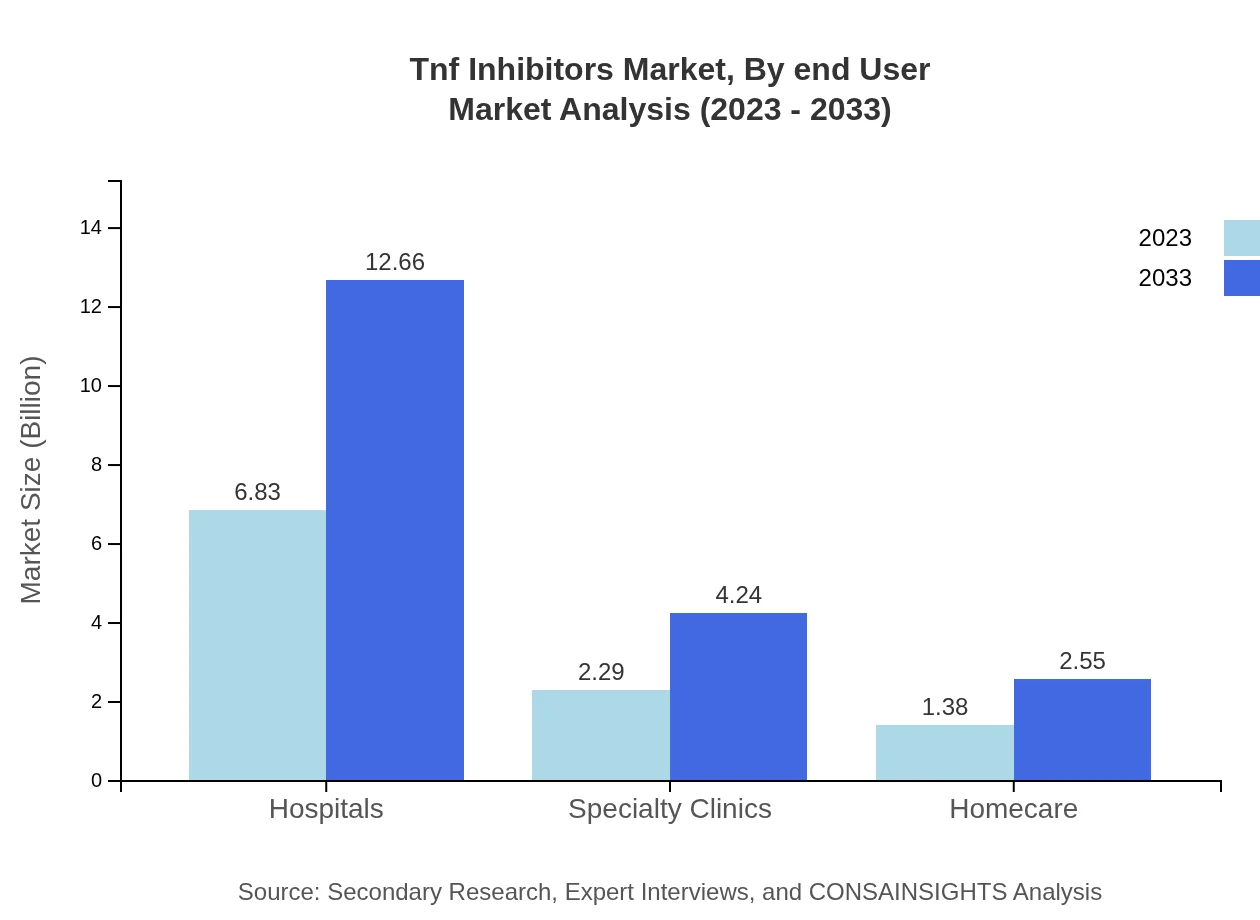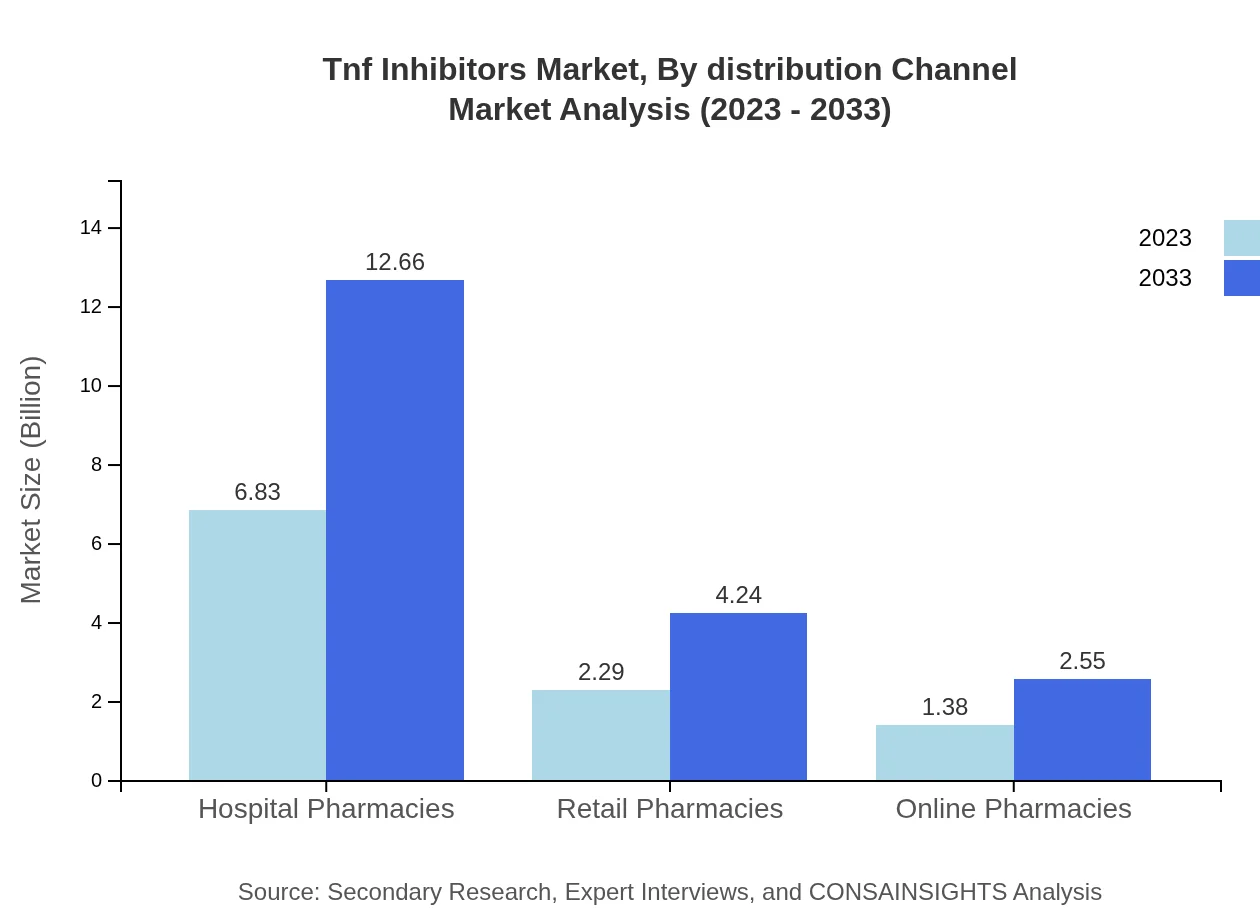Tnf Inhibitors Market Report
Published Date: 31 January 2026 | Report Code: tnf-inhibitors
Tnf Inhibitors Market Size, Share, Industry Trends and Forecast to 2033
This report provides a comprehensive analysis of the TNF inhibitors market, offering insights into market size, growth potential, industry dynamics, regional performance, and future trends for the forecast period from 2023 to 2033.
| Metric | Value |
|---|---|
| Study Period | 2023 - 2033 |
| 2023 Market Size | $10.50 Billion |
| CAGR (2023-2033) | 6.2% |
| 2033 Market Size | $19.45 Billion |
| Top Companies | AbbVie Inc., Johnson & Johnson, Amgen Inc., Sanofi, Bristol-Myers Squibb |
| Last Modified Date | 31 January 2026 |
Tnf Inhibitors Market Overview
Customize Tnf Inhibitors Market Report market research report
- ✔ Get in-depth analysis of Tnf Inhibitors market size, growth, and forecasts.
- ✔ Understand Tnf Inhibitors's regional dynamics and industry-specific trends.
- ✔ Identify potential applications, end-user demand, and growth segments in Tnf Inhibitors
What is the Market Size & CAGR of Tnf Inhibitors market in 2023?
Tnf Inhibitors Industry Analysis
Tnf Inhibitors Market Segmentation and Scope
Tell us your focus area and get a customized research report.
Tnf Inhibitors Market Analysis Report by Region
Europe Tnf Inhibitors Market Report:
The European TNF inhibitors market is forecasted to grow from USD 2.79 billion in 2023 to USD 5.17 billion by 2033. The presence of advanced healthcare systems, regulatory support for biologics, and increasing demand for effective treatment options in countries such as Germany and France contribute to this growth.Asia Pacific Tnf Inhibitors Market Report:
In the Asia Pacific region, the TNF inhibitors market is anticipated to expand from USD 2.26 billion in 2023 to USD 4.19 billion by 2033. Growth is fueled by increasing healthcare infrastructure and rising awareness of TNF inhibitors among patients and healthcare providers. China and India are significant contributors to this growth due to their large patient populations and expanding market access.North America Tnf Inhibitors Market Report:
North America remains the dominant market for TNF inhibitors, projected to grow from USD 3.54 billion in 2023 to USD 6.56 billion by 2033. The U.S. leads the market, bolstered by significant investments in healthcare, robust research and development activities, and a large population suffering from chronic inflammatory disorders.South America Tnf Inhibitors Market Report:
The South America TNF inhibitors market is expected to grow from USD 0.49 billion in 2023 to USD 0.90 billion in 2033. Factors such as rising healthcare expenditure and the increasing prevalence of autoimmune diseases drive this growth, alongside improved access to advanced medications.Middle East & Africa Tnf Inhibitors Market Report:
The Middle East and Africa TNF inhibitors market is predicted to grow from USD 1.42 billion in 2023 to USD 2.63 billion by 2033. Although the market is at a nascent stage, increasing investments in healthcare infrastructure and awareness regarding autoimmune diseases are expected to drive growth.Tell us your focus area and get a customized research report.
Tnf Inhibitors Market Analysis By Drug Class
The TNF inhibitors market by drug class is dominated by monoclonal antibodies, representing a significant share of the market. Monoclonal antibodies contributed USD 10.81 billion in 2023 and are projected to reach USD 20.70 billion by 2033. Fusion proteins also hold a considerable part of the market due to their efficacy in treating chronic inflammatory diseases.
Tnf Inhibitors Market Analysis By Indication
By indication, rheumatoid arthritis remains the leading segment in the TNF inhibitors market, valued at USD 4.49 billion in 2023 and expected to reach USD 8.32 billion by 2033. Other indications such as psoriasis and inflammatory bowel disease are also witnessing significant uptake, highlighting the versatility of TNF inhibitors in managing various inflammatory conditions.
Tnf Inhibitors Market Analysis By Route Of Administration
Subcutaneous injections dominate the TNF inhibitors market by route of administration, accounting for USD 6.83 billion in 2023, with a forecasted growth to USD 12.66 billion by 2033. This preference is largely due to ease of administration and patient compliance. Intravenous and oral routes also contribute to the market but with a smaller share.
Tnf Inhibitors Market Analysis By End User
Hospitals are the primary end-users of TNF inhibitors, accounting for USD 6.83 billion in 2023 and set to grow to USD 12.66 billion by 2033. Specialty clinics and homecare settings also experience growth owing to increased patient preference for outpatient therapies and the rise of telemedicine and home healthcare services.
Tnf Inhibitors Market Analysis By Distribution Channel
Hospital pharmacies dominate the distribution channels for TNF inhibitors, contributing USD 6.83 billion in 2023 and expected to reach USD 12.66 billion by 2033. Retail and online pharmacies also play crucial roles in improving access to these therapies, especially with the increasing trend of e-commerce in healthcare.
Tnf Inhibitors Market Trends and Future Forecast
Tell us your focus area and get a customized research report.
Global Market Leaders and Top Companies in Tnf Inhibitors Industry
AbbVie Inc.:
AbbVie is a global biopharmaceutical company known for its leading TNF inhibitor, Humira, which has transformed the treatment landscape for autoimmune disorders.Johnson & Johnson:
Johnson & Johnson is a major player in the TNF inhibitors market, known for Remicade, which provides effective treatment options for various inflammatory conditions.Amgen Inc.:
Amgen is recognized for its innovative approaches in biologics and has made substantial contributions with its TNF inhibitors like Enbrel.Sanofi:
Sanofi offers a range of therapeutic options in the TNF inhibitors sector, particularly through its product, Kevzara, contributing to significant market share.Bristol-Myers Squibb:
Bristol-Myers Squibb is known for its immunology portfolio, including TNF inhibitors that cater to patients with severe autoimmune diseases.We're grateful to work with incredible clients.









FAQs
What is the market size of TNF-Inhibitors?
The TNF-Inhibitors market is valued at approximately $10.5 billion in 2023 and is projected to grow at a CAGR of 6.2%, reaching significant expansion by 2033, driven by increasing demand for biologic therapies.
What are the key market players or companies in the TNF-Inhibitors industry?
Key players in the TNF-Inhibitors market include renowned pharmaceutical companies such as Amgen, AbbVie, Johnson & Johnson, and Pfizer. Their strong market presence and continuous innovation contribute significantly to the industry's growth.
What are the primary factors driving the growth in the TNF-Inhibitors industry?
Growth drivers in the TNF-Inhibitors market include rising prevalence of autoimmune diseases, advancements in biotechnology, and increasing patient awareness regarding treatment options, alongside favorable reimbursement policies in many regions.
Which region is the fastest Growing in the TNF-Inhibitors market?
The fastest-growing region for TNF-Inhibitors is Europe, with a market expectation of $5.17 billion by 2033, up from $2.79 billion in 2023, reflecting strong demand and advancements in treatment solutions.
Does ConsaInsights provide customized market report data for the TNF-Inhibitors industry?
Yes, ConsaInsights offers customized market report data tailored to specific needs within the TNF-Inhibitors industry, ensuring clients receive relevant insights based on emerging trends and competitive analyses.
What deliverables can I expect from this TNF-Inhibitors market research project?
Expect comprehensive market analysis reports, segment-wise breakdowns by region and therapy, competitive landscape insights, and forecasts highlighting market size, growth rates, and trends over the next decade.
What are the market trends of TNF-Inhibitors?
Current trends in the TNF-Inhibitors market include the rise of personalized medicine, increased use of oral formulations, and a shift towards combination therapies to enhance efficacy and reduce adverse effects.

